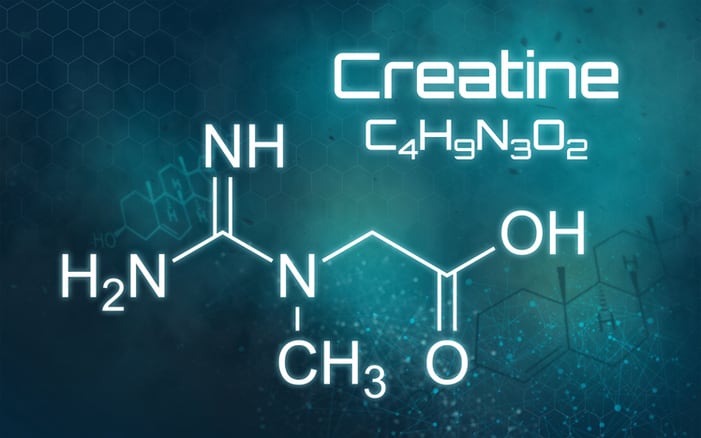Published by researchers at Brandon University, Canada, the analysis looked at the current evidence surrounding creatine supplementation on total creatine and phophorylcreatine (PCr) content. Its main aim was to explore the guanidinoacetic acid (GAA – a creatine precursor) as an alternative or whether it could work with creatine supplementation on brain creatine uptake in relation to several brain-centred conditions.
There is a plethora of existing evidence that proves the positive effects of creatine on skeletal muscle creatine levels, muscle mass and function in sports performance, strength, resistance to fatigue and exercise training. However, the review team believes research is very limited regarding the impact of creatine on brain creatine and brain function including cognitive processing and recovery from brain injury.
Researchers in this review found there is growing evidence to support the positive effect creatine has on the brain, but more specific studies are needed. They noted that the brain is a highly energetic complex organ, consuming approximately 20% of total resting energy despite accounting for only about 2% of total body mass.
Creatine, a nitrogenous organic compound derived from reactions involving the amino acids arginine, glycine, and methionine, is important for resynthesising ATP, the principal molecule for storing and transferring energy in cells. This is needed particularly during times of increased metabolic demand such as sleep deprivation, mental health conditions, or neurological diseases.
Mixed results from studies
The review highlighted robust evidence that clearly demonstrated the importance of creatine on cognitive function for individuals with creatine deficient syndromes, known to deplete brain creatine stores. Creatine deficiency syndrome is characterised by mental and developmental disorders such as learning delays and seizures, but these can be partly reversed by creatine supplementation, previous studies have shown.
Researchers wrote: “There are mixed results in humans with some studies finding benefits on cognitive functioning while others finding no effect.
“Sleep deprivation is known to impact brain bioenergetics and it seems the effects of creatine supplementation in combination with sleep deprivation may enhance cognitive function compared to placebo but there are only two studies that have investigated cognitive function following sleep deprivation in humans and both were combined with mild to moderate exercise.”
Overall various cognitive tests have proven that creatine can augment measures of cognitive functions and that these cognitive effects appear to be more robust when brain bioenergetics are challenged, such as sleep deprivation.
Neurogenerative diseases and mental health
The researchers felt that because of the positive effects of creatine on muscle strength, mass and functionality, looking at its potential to mitigate disease-related physical impairments common in neurogenerative diseases was justified. However, after looking at several conditions including Parkinson’s, Multiple Sclerosis and Huntington’s Disease they found that “creatine supplementation appears to have limited if any, clinical effect on the progression or management of neurodegenerative diseases”.
The two most prevalent mental health conditions are depression and generalised anxiety disorder and deficiency in creatine can affect intellectual disability, language delay seizure disorders, autism spectrum disorders and various motor movement disorders with the primary treatment being creatine monohydrate supplements in an attempt to increase the content of creatine in the brain.
Research conclusions
After analysing several studies, the researchers concluded that while there is a possible role for creatine in the treatment of various forms of depression but much larger-scale, randomised studies are needed and should include measures of brain creatine. They that more work is also warranted in the possible use of creatine in the treatment of general anxiety disorder and post-traumatic stress disorder.
The reviewers noted that beyond muscle, accumulating research shows that creatine supplementation and GAA can increase brain creatine content which may explain some of the initial benefits for those with depression, concussion and other cognitive issues but there is a lack of research with inconsistencies regarding the efficacy of creatine particularly when it comes to treating symptoms of neurodegenerative diseases, anxiety, or PTSD. Future research is needed to determine the mechanism and clinical effects on brain function and health.
Source: Nutrient
Published online: doi.org/10.3390/nu14050921
“Effects of Creatine Supplementation on Brain Function and Health”
Authors: Scott C Forbes et al





